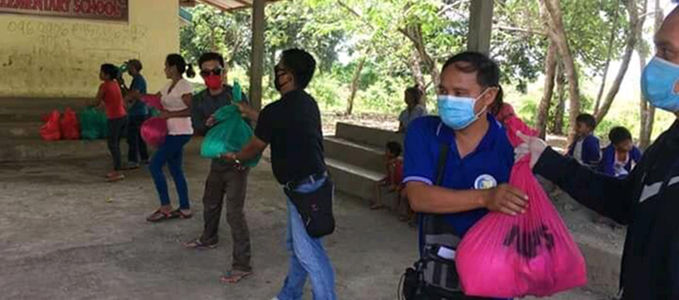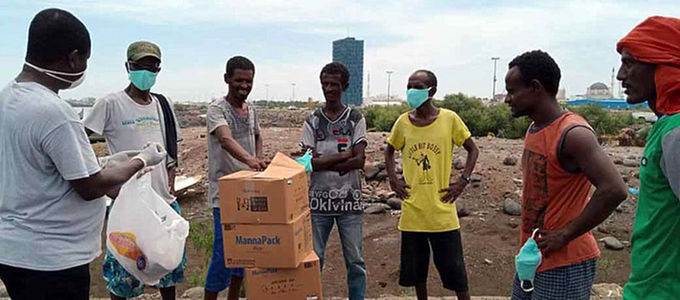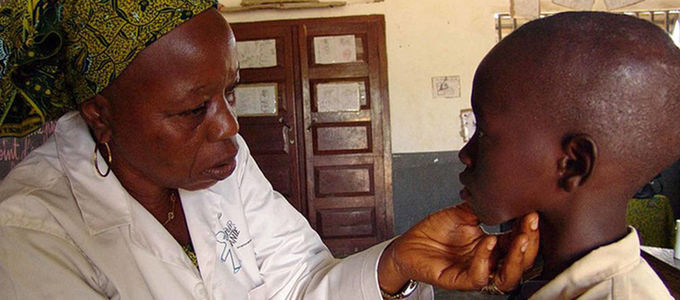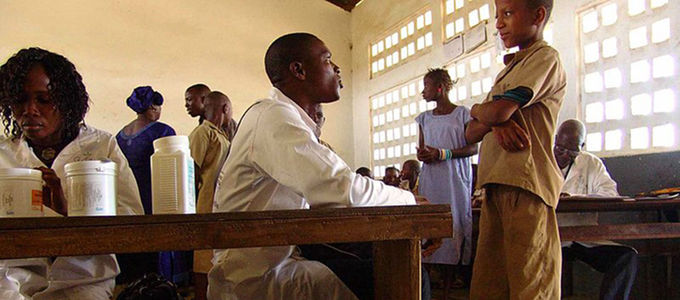Helping where Covid-19 has fueled hunger and poverty

For many people Covid-19 is just one more emergency they have to cope with. For them it has long been a question of survival! Here is what New Apostolic organisations are doing to alleviate the worst.
The situation in Africa is particularly dramatic, NAK-karitativ points out and reports from Kenya: “In the slums of Nairobi, the virus is causing catastrophic situations. The few hospitals and doctors are hopelessly overburdened.” While the official figures seem “relatively low”, the estimated number of unreported cases is huge.
“It may not be much, but it is a start.”
The charity has been working to improve people’s lives in Mukura Slum in Nairobi for years now. Together with KUMEA, the aid organisation of the New Apostolic Church East Africa, and a local organisation called On Eagles’ Wings (OEW), several hundred particularly affected families are receiving emergency aid kits. The kits contain basic foodstuffs and hygiene items. “Given the hardship it may not be much, but it is a start.”
The New Apostolic Church South-East Asia provided food and a foot-operated hand-washing station on Mindanao, the second largest island in the Philippines. Funded by a group of Swiss merchants, NAC SEA Relief Fund took care of the logistics including the transport into the crisis region.
Emergency rations are also available in digital form
NAK-karitativ is also helping several thousand families in cooperation with Masakhe Foundation, the charity of the New Apostolic Church Southern Africa. The families are receiving food and hygiene kits. The Church office in South Africa is increasingly relying on vouchers in digital form to reduce the risk of infection by reducing avoidable contacts.
Nonetheless, the Church in South Africa has received permission from the Police Services to distribute food parcels to seniors and needy people. In addition, approved aid agencies requiring drop-off and collection points may utilise our churches. And finally, Apostles are establishing partnerships between congregations to provide support to members in need.
Swift aid is essential
The charity of the District Church Southern Germany, human aktiv, has released immediate aid to the tune of 70,000 euros for four African countries.
- Families in Djibouti in East Africa are being provided with masks, gloves, soap, and essential food items.
- Hygiene courses, health scouts, and washing facilities are being funded in the southern part of Guinea.
- In Ghana, supporting governmental aid programmes are receiving support.
- In Uganda, health scouts are being trained. These are former street children who are to advocate better health practices among their friends in the slums.
The charity, human aktiv, has given the same amount to food banks in southern Germany as additional emergency aid. Here people living precarious lives can buy food at reduced prices and often also other everyday necessities. Although Covid-19 is putting increasing pressure on many people and exacerbating the need of the vulnerable, food banks are receiving fewer food donations.
Lockdown spent on the construction site
Meanwhile, ongoing humanitarian aid actions are continuing. The three German District Churches Northern and Eastern Germany, Southern Germany, and Western Germany have donated a total of 186,000 euros to Mantapala Refugee Settlement in Zambia. It is situated in the north of the country and shelters nearly 15,000 people who had to flee from the Democratic Republic of the Congo. NACRO, the charity of the New Apostolic Church Zambia, is organising the aid locally.
And one joint project by NAC SEA Relief in the Philippines and NAK-Humanitas (NAC Switzerland) is braving the coronavirus lockdown with special clearance from local authorities and the necessary precautions. Work is continuing on the new school building in Bugton Kahoy on the island of Negros in the Philippines. The facility is to be completed by the beginning of the new school year at the end of August. In order to be able to finish on time, the workers spent the lockdown—more than two months—on the construction site instead of with their families.
























